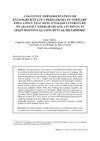Please use this identifier to cite or link to this item:
https://accedacris.ulpgc.es/jspui/handle/10553/77230
| Title: | Cognitive implementation of incongruent L2/C2 pedagogies in tertiary education: Teaching english literature to spanish undergraduate students in spain hosting L2 conceptual metaphors | Authors: | Guerra De La Torre, Juana Teresa | UNESCO Clasification: | 570113 Lingüística aplicada a la traducción e interpretación 570107 Lengua y literatura |
Keywords: | Biopoética Poética cognitiva Conocimiento enactivo Metáfora Método de enseñanza en segunda lengua, et al |
Issue Date: | 2020 | Journal: | Odisea: Revista de estudios ingleses | Abstract: | El estudio de caso descrito explora las condiciones translingüísticas y transculturales
en las que los estudiantes españoles entienden a través de tareas de lectura la forma de
pensar de los escritores experimentales ingleses del siglo xvii o xx mediante textos en
inglés de la Ilustración, el Modernismo y el Postmodernismo. Se describirán situaciones
interculturales así como traslacionales e interlingüísticas, y la ruptura/interrupción de
los procesos cognitivos del lector. Hasta ahora, las prácticas académicas relacionadas
con el español se han basado principalmente en metáforas unidireccionales de conducto
y de transmisión (Reddy 1979), rompiendo así la organización conceptual, lingüística
y cultural de los textos originales que, yendo más allá, rompen la organización artística
del idioma inglés común para mejorar la percepción del lector de otras mentes y
experiencias vivientes. Tanto la Poética Cognitiva (de Tsur 2002) como su extensión
más dinamista, la Biopoética (Guerra 2013, 2016), pueden considerarse un marco
metodológico real para una lectura unificadora de textos de diferentes culturas, épocas
y géneros. This paper explores and evaluates a novel theoretical foundation and method for teaching unconventional/experimental literary texts in a non-native language. The case study described explores the crosslinguistic and crosscultural conditions in which Spanish undergraduates understand the way English experimental writers think, during tasks of reading 17th or 20th c. English texts from the Enlightenment, Modernism, and Postmodernism. Intercultural as well as translational and interlingual situations, and breakage/disruption of cognitive processes of the reader will be outlined. So far, related Spanish academic practices have mostly relied on unidirectional conduit and transmission metaphors (Reddy 1979), thus breaking the conceptual, linguistic, and cultural organization of original texts that further artfully break the organization of ordinary English language to enhance the reader’s perception of other living minds and experiences. Both Cognitive Poetics (from Tsur 2002) and its more dynamicist extension Biopoetics (Guerra 2013, 2016) seem to be a true-to-life methodological framework for a unifying reading of texts from different cultures, times and genres. |
URI: | https://accedacris.ulpgc.es/handle/10553/77230 | ISSN: | 1578-3820 | Source: | Odisea: Revista de estudios ingleses [ISSN 1578-3820], n. 21, p. 101-124 | URL: | http://dialnet.unirioja.es/servlet/articulo?codigo=7708376 |
| Appears in Collections: | Artículos |
Page view(s)
127
checked on Jul 13, 2024
Download(s)
80
checked on Jul 13, 2024
Google ScholarTM
Check
Share
Export metadata
Items in accedaCRIS are protected by copyright, with all rights reserved, unless otherwise indicated.
